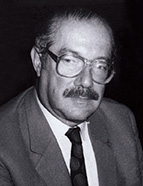

Unable to perform public duties, Mr. Farinha dos Santos was invited in the late '70s to co-found the History degree programme at Universidade Livre , where he taught Archaeology, Epigraphy, and Greco-Roman Numismatics. In 1986, he contributed to the founding of the Universidade Autónoma de Lisboa [Autonomous University of Lisbon], where he is responsible for teaching Prehistory and the Archaeology Seminar. In the early '90s, he established the Centre for Archaeological Studies and a specialised course in Archaeology, which enabled students to pursue a doctorate at the University of Salamanca (Spain) through his personal scientific network. M. Farinha dos Santos consistently encourages his students and collaborators to stay up to date in their fields and pursue interdisciplinary, institutional, and international scientific collaborations, as he believes these are essential for a thorough understanding of the past. He also encouraged them to use multiple technological resources, such as aerial photography, and to seek support from specialists at institutions such as the Serviços Geológicos de Portugal [Geological Services of Portugal] (founded in 1918), the Laboratório Nacional de Engenharia Civil [National Civil Engineering Laboratory] (1946), the Centro Português de Atividades submarinas [Portuguese Centre for Underwater Activities] (1953), and the Instituto de Antropologia Professor Mendes Correia [Professor Mendes Correia Institute of Anthropology] at the University of Porto.
From 1964 to 1974, he was appointed as a member of the archaeology sub-section of the 6th section of the Junta Nacional da Educação [National Board of Education] as part of an advisory body to the Ministry of National Education, M. Farinha dos Santos issued numerous opinions on archaeological work across the country. Focusing on safeguarding issues, he advocated for stronger legislation and the establishment of a well-resourced body to decentralise archaeological work, working in collaboration with university research centres and museums. In 1972, he played a significant role in the creation of the Archaeology Work Group of the Gabinete da Área de Sines [Sines Area Office], a pioneering initiative in Portugal focused on the study, valorisation, and dissemination of the archaeological heritage of a large region, leading to numerous published works.
This work is financed by national funds through FCT - Foundation for Science and Technology, I.P, in the scope of the projects UIDB/04311/2020 and UIDP/04311/2020.
